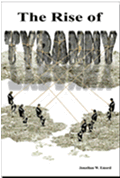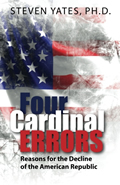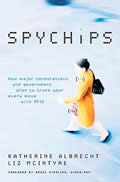CIVIL WRONGS: 20 YEARS AFTER
By Professor
Steven Yates
October 14, 2014
NewsWithViews.com
[Author’s note: this is not a contribution to “The Real Matrix” series. That series will continue soon.]
As of this month (November 4 was the official publication date), my first book—Civil Wrongs: What Went Wrong with Affirmative Action (San Francisco: ICS Press, 1994)—will be exactly 20 years old. The book received some favorable reviews. ICS Press did an acceptable job getting the word out, but they are a small operation and most of their contacts seemed to be with local talk radio hosts. I had some good experiences, a few bad ones, and some in-between ones. But on the national level, the book was barely noticed.
It received good local publicity, however, and so was noticed by my immediate superiors.
The following spring, the philosophy department where I had been teaching on a one-year renewable contract refused to renew it. The purveyors of tolerance and diversity had spoken. I’d transgressed one of their most important boundaries. I was out of a job, in other words: which I noted in subsequent writings is how our system handles dissent. Instead of transparent and ultimately self-defeating ploys like sending critics of official policies to gulags like the Soviets did or lining them up against a wall and shooting them, like the Nazis did, corporatism threatens them with unemployability, and then cynically says (by implication, anyway), “You’re starving? It’s your own fault! You should have kept your fool mouth shut!”
Truth is the real victim, no matter the strategy. Sooner or later, though, it comes out. Always. Even if by way of denial, which exacts tragic consequences.
I got back on my feet, got another university degree (before realizing the pointlessness of that), eventually found myself teaching philosophy again. But enough about me. What about the book? What did it say, what did it and other writings I was issuing at the time predict, and how well does it hold up after 20 years?
Civil Wrongs tried to weave together a number of themes. Its main purpose was to criticize affirmative action, which had come under increasing fire both within the legal system and by scholars, including black intellectuals (Walter Williams, Thomas Sowell, Shelby Steele, Anne Wortham, etc.). It also discussed radical “gender feminism” in light of the fact that in higher education, the main beneficiaries of affirmative action preferences were not blacks but white women—many of whom had boulder-sized chips on their shoulders. I also examined multiculturalism, the homosexual movement the rapid rise of which compelled a couple of last-minute rewrites, but especially the political correctness (PC) that seemed the common denominator running through all of these. It was clear to me that the academic permutations of these movements were easily explainable on the basis of preferences for everyone except straight white Christian men. PC had developed, first and foremost, to protect affirmative action preferences from the sort of effective criticism it had experienced following a stream of lawsuits the first of which was University of California at Davis v. Bakke (1978), culminating in Ward’s Cove v. Atonio, Martin v. Wilkes, City of Richmond v. Croson (all notably in 1989). Clearly, preferential policies were under attack. PC’s strategy was to blacklist critics as racists—and to protect and further these new forms of “scholarship” even though they wouldn’t have been considered publishable prior to the 1980s when higher education began its decline. Integral to this strategy was to deny that PC actually existed. We white guys had made it all up; it was just whining by those who no longer had the privileges to which they’d been accustomed. My response to that ploy was, What privileges? No one had done me any favors!I could find no government agencies going to bat for white guys who came from middle class backgrounds. The retort seemed to be: they’re invisible to you because you’re white. Perfectly circular logic.
Part of my argument had been semantic and logical. The term affirmative action had not been defined. This left it to the courts to hammer out its meaning, and they did: preferences for some at the expense of others. While terms like quotas or quota system received sharp rebukes, I noted that the frequent use of phrases like “under represented groups” in pro-affirmative action materials requires just that: under represented logically presupposes correct representation, which if made precise, calls for specific ratios or quotas based on presumed availability of groups in the workforce.
Civil Wrongs was initially rejected by around 80 publishers. By the time it came out, over two years after its completion (except for the above-mentioned rewrites) PC had become the dominant form of political life in academia. The book made several predictions. For starters, it had prediction that unless PC was opposed by those well enough situated to seize moral high ground, it would spread very quickly, like a virus, to every institution in American society.
That, of course, was what happened. The opposition was scattered and ineffective, possibly sabotaged from within. We often squabbled amongst ourselves. The academic left and its appendages were very well organized (and remember, the Internet was in its infancy back then). PC soon infiltrated the military via its academies, as court decisions forced all-male bastions like The Citadel and VMI to admit women. We soon began to hear about “gays in the military.”
By the late 1990s it was clear that PC had spread to corporate America. Lack of “sensitivity” to, e.g., gay issues, was costing private sector employees their jobs. Take professional sports: recall the fate of Atlanta Braves star relief pitcher John Rocker who saw his career ruined after his not-too-subtle description of New York subway riders in 1999. Of interest was the hostility directed towards Rocker not by professional baseball but from fans. The extent to which PC now controls all major public media is evident in that it is extremely difficult to find an account of Rocker’s activities, then or more recently on Survivor, that does not bristle with animosity as it revisits allegations of his “racism, homophobia,” etc.
Rocker had opened his mouth to a reporter. This was dangerous, as journalism had been thoroughly infected with PC. In 2000, while living in Columbia, South Carolina, I had a bird’s eye view of the destruction of a 40-year-old food and restaurant business. The late barbecue baron Maurice Bessinger had hoisted Confederate flags over his stores to protest the removal of the flag from the State House Dome on July 1, 2000. In late August, a reporter for Columbia’s left-leaning newspaper, The State, wrote a front-page hit piece on Bessinger. The reporter had seen (not read) tracts in Bessinger’s main store describing slavery in the Old Testament. Based on this, the reporter insinuated that Bessinger’s defense of the Confederate flag was rooted in a belief in slavery.
One by one, under pressure from the NAACP, major grocery chains pulled Bessinger’s products from their shelves. In perhaps two months, the business was largely destroyed. Bessinger had to close his main plant as demand had plummeted, and over a hundred employees (many of them black) lost their jobs. No one had bothered to verify whether there was truth to the specific allegation; Bessinger’s flying Confederate flags was enough. His real thought crime was in proclaiming that the flag bearing the Cross of St. Andrews symbolized freedom from oppressive central government, not slavery. His book argues his case (but again, read the hostile customer reviews).
Southern culture had been under PC fire via tabloid-quality journalism. A year or so earlier, a North Carolina preservationist and part-time history professor, Jack Perdue, had his life destroyed when yet another reporter penned an inflammatory article alleging that he was teaching a community college history class from a Confederate perspective and contending that “most black people had been happy under slavery.” Left wing syndicated columnists picked up the story and newspapers broadcast it across the country,again with no one bothering to verify anything. They would have found out that the “happy slaves” allegation was fabricated. Perdue, a shy man acutely uncomfortable under a media spotlight, unable to get his side of the story told and contemplating a libel suit, died of a heart attack the following year. (My extended account is here.)
Returning to 1994, I had penned a journal article entitled “Civil Wrongs and Religious Liberty.” That article predicted that PC and Christian practices would soon be on collision course. The wedge issue would be homosexual conduct, which all major religions (not just Christianity) condemn, and rising issues like gay marriage which were’t much on the public radar in 1994 but definitely stirring. This prediction, too, has borne stunning fruit, as businesses are now destroyed when their proprietors refuse, on religious grounds, to service “gay weddings.”
Right before the Bessinger debacle I’d written an article entitled “Brave New Generation.” I predicted the rise of a generation—now called the millennials—who would grow up never having known a world without PC. This generation began to be born in the early 1980s. The oldest began enrolling in universities around 2000. To them, PC would be the new normal. Free speech would be an alien concept. In just a few years, I wrote, the bulk of the Brave New Generation would be old enough to vote!
This generation was, indeed,instrumental in putting Barack Obama in the White House. Many clearly believed they were supporting the next political messiah. When, in fall of 2008, I saw the entranced, vacuous stares of those responding to a cognitively empty message of “hope and change,” I found myself concluding quietly that in all probability, the battle against PC was lost, and possibly the country itself would soon follow.
Others were less pessimistic. They supported, e.g., Ron Paul’s candidacies for the Republican nomination for president both in that year, and again in 2012. I worked with them, seeing Dr. Paul as the U.S.’s last hope, at the national level anyway. In 2008 I watched as Dr. Paul’s efforts to turn attention back to the Constitution were ignored by mainstream media and easily thwarted by the dominant members of his own party. The neocons who controlled the Republican Party had long had a penchant for discrediting themselves by nominating Establishment candidates whose values had little in common with much of their voter base. The Establishment nominated the embarrassing McCain/Palin pair-up. They didn’t learn anything. Another disaster ensued in 2012 with Mitt Romney. Despite the struggling economy, Obama won a second term handily.
Was it worth it? Would I do it again, knowing that writing a book like that would severely damage my own career? Would I write it the same way?
These are questions I’ve sometimes pondered. A lot has changed, after all, and some of my views have changed as well. There are people who interpret views such as mine as rooted in fearful opposition to the rising stature of women and minorities. That wasn’t it at all. My field of philosophy had no visible blacks prior to the PC era but a number of influential women accorded respect because of their contributions to the discipline, not because of their sex (British philosophers Elizabeth Anscombe, Mary Midgley and Susan Haack come to mind, or think of German philosopher Hannah Arendt, author of some of the most stirring warnings against the temptations of totalitarian thinking). I was opposed to all of us being branded with group identity, some being granted government favors on the basis of identity at the expense of others. If anything guaranteed further division, it was this! Thomas Sowell, it seemed to me, had adequately documented that preferential policies, whatever one calls them, invariably result in tensions and sometimes eventual violence between groups accorded favors and those not.
I had the same views of slavery, moreover, as those who hated my book. It was a huge mistake, as were intellectually dishonest “separate but equal” notions furthered later (e.g., in Supreme Court decisions such as Plessy).
What I rejected was the idea that a policy of racial (and gender) realignment—at attempt to socially engineer every institution in society—as if slavery and discrimination had never existed, could possibly lead to anything except more division. There was no way of knowing, after all, how race and gender percentages would line up in education or the workplace had there been no slavery and no discrimination.
Let’s look at matters this way: if your goal is to bring peoples together, what do you do? You get them talking about common problems and establish common ground. They don’t have to agree on everything; the point is, to open up a dialogue. There are black people and white people who have the same problems—economic, familial, etc.All of us now live in an increasingly corporatist environment, forced to work around and sometimes within institutions that purposefully limit our options and sometimes simply lie to us. We don’t have to deny history, although the differences between black history and white history are exaggerated. It is true: most American blacks are descended from people once held as slaves. But there are poor whites descended from indentured servants who also did not come to the New World willingly. The British Empire saw an opportunity to dump a portion of its underclass on Colonial America and took it. This is one of the dirty little secrets of the relationship between the two.
We have to break the chains of our histories, however, if we are to look to the future instead of dwelling on the past. Many of the problems faced by blacks today have nothing to do with slavery or discrimination. They have to do with broken families, horrid schools, a violent gang culture (especially in cities), substance abuse, teen pregnancy, and a great deal of hopelessness produced by failed public policy and countered only by a politically-induced entitlement mentality.
Many problems of higher education today are effects of the endeavor’s corporatization. If anything has changed dramatically in my views, it is this: I once considered PC as almost exclusively an academic left product, that of former student revolutionaries who stuck around on campuses, biding their time, until they gained tenure and began reshaping the academic culture. They threw their weight around in a few academic disciplines—philosophy, history, comparative literature, sociology, a few others—and created a few new ones, such as gender studies, Afro-American studies, critical race theory, queer theory (their term, not mine).
My question today: could this have been allowed to happen, to discredit the humanities and social sciences, producing pseudo-scholarship no rational adult can take seriously and graduates who really are unemployable, while maintaining the divisive and destructive policies—all so that peoples on different sides of the various divides would look at one another with suspicion and hostility and not see what is happening at the very top?
I am not saying there was a conscious conspiracy here. It probably wasn’t necessary. Corporate elites saw what happened in the 1960s, as I noted in “The Real Matrix.” They noted which disciplines had produced those they considered troublemakers. One of those was philosophy, which has been hobbled by pseudo-scholars ever since. The elites, including those infiltrating university administrations, simply did nothing while the humanities self-destructed. Once the responsible adults retired, there was less and less to stop the younger radicals—especially in a hostile “buyer’s” market where PC types can hire more of their own. This was as much demographics as it was politics.
The humanities have lost influence (and funding) since that era, while STEM subjects, as they are now called, have been ratcheted up. Skyrocketing tuition and student loan debt have also served as not-so-subtle incentives to students to view their university experience exclusively as a path to a good STEM job, so they have some hope of repaying that enormous debt!
|
|
What I call real education—emphasizing history, philosophy (logic and ethics), geography, religion, literature; also a few like health and nutrition—has now been neglected for more than three decades. PC has been one highly visible wing of that neglect, useful because it is sensational and proves effective for thought control. Why do the above subjects matter? Because when taught properly, they provide students with tools for thinking well: understanding where they came from, what their values are, where their best interests might lie—and above all, that rational thought does not bow automatically before authority. This will help them define for themselves where they want to go, instead of where those in power want them to go.
The aim of corporatism, after all, is a controlled population—of whatever race or ethnicity, whichever gender, whatever sexual preference. The super elite want control over as much of the planet as possible—by controlling its finances, its resources, and by necessity its media and its educational systems. They couldn’t care less about blacks, women, or gays, except as tools to be used. That—because I simply didn’t know it back in 1994—is what Civil Wrongs missed. We certainly don’t want to miss it today!
� 2014 Steven Yates - All Rights Reserved
Steven Yates has a doctorate in philosophy and currently lives in Santiago, Chile. He is the author of Four Cardinal Errors: Reasons for the Decline of the American Republic (Brush Fire Press International, 2011). He also owns an editing business, Final Draft Editing Service.
Steven Yates's new ebook is entitled: Philosophy Is Not Dead: A Vision of the Discipline's Future.
E-Mail: freeyourmindinsc@yahoo.com















 Share
This Article
Share
This Article






